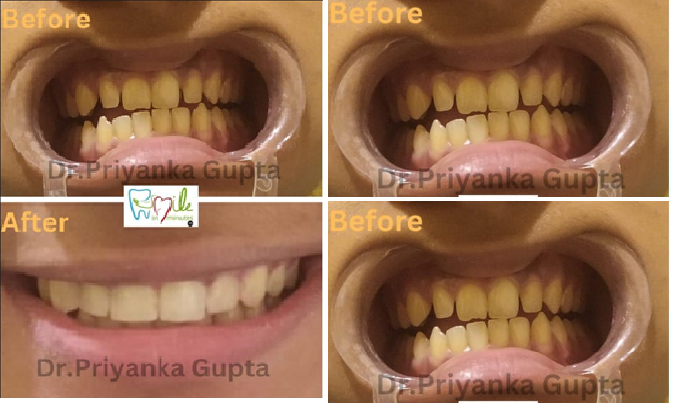
Composite veneers are a cosmetic dental treatment that involves placing a thin layer of tooth-coloured composite resin over the front surface of the teeth to improve their shape, size, colour, and overall appearance. The composite resin is matched to the colour of the natural teeth, making the veneers virtually indistinguishable from the real teeth.
How are composite veneers applied?
Composite veneers are typically applied in a single appointment. The dentist will prepare the teeth by removing a small amount of enamel to make room for the veneers. The composite resin is then applied in layers and sculpted to the desired shape. A special light is used to harden each layer of the resin. Once the desired shape is achieved, the veneers are polished to give them a natural appearance.
What are the advantages of composite veneers?
Composite veneers offer several advantages over other types of veneers, including:
• Composite veneers are a more affordable alternative to porcelain veneers.
• While porcelain veneers are made in a laboratory and require multiple visits to the dentist, composite veneers can be applied in a single visit to the dentist's office.
• Composite veneers are a minimally invasive procedure.
• Unlike porcelain veneers, which require the removal of a thin layer of enamel from the teeth, composite veneers can be applied directly to the surface of the teeth with little or no tooth reduction.
• Composite veneers can be used to correct a variety of cosmetic dental issues, including chipped, cracked, or discoloured teeth, as well as gaps and minor alignment issues.
• They are also reversible and can be repaired easily if they become damaged. Unlike porcelain veneers, which require permanent alteration of the teeth, composite veneers can be removed without damaging the underlying tooth structure.
What are the Limitations of composite veneers?
• Composite veneers may not be suitable for all cases, such as severe misalignment or significant gaps between the teeth. In these cases, orthodontic treatment or other cosmetic options may be recommended.
• They are not as durable as porcelain veneers and may need to be replaced more frequently.
• They are more prone to staining than porcelain veneers.
• They are not as translucent as porcelain veneers, which can make them look less natural in certain lighting conditions.
How long do composite veneers last?
The lifespan of composite veneers varies depending on several factors, including the quality of the material used, the skill of the dentist, and the oral hygiene habits of the patient. On average, composite veneers last between ten and fifteen years or more before needing to be replaced.
How do I care for composite veneers?
Composite veneers require the same care as natural teeth, including brushing twice a day, flossing once a day, and visiting the dentist regularly for cleanings and check-ups. It is also important to avoid biting or chewing on hard objects, as this can damage the veneers. Additionally, patients should avoid smoking and limit their consumption of stain-causing foods and beverages.
Cost: The cost of composite veneers varies depending on the number of teeth being treated, the complexity of the case, and the dentist's fees. In general, composite veneers are less expensive than porcelain veneers.
Overall, composite veneers can be a great option for improving the appearance of your smile. Composite veneers may not be suitable for everyone. Patients with severe tooth decay or gum disease may not be good candidates for composite veneers, and may require other forms of dental treatment. Additionally, patients with bruxism or teeth grinding may be at risk for damaging their composite veneers and may need to wear a night guard to protect their teeth.
Our Doctors
SMILE IN MINUTES Dental Care Doctors

Dr. Priyanka
Sr. Dental Surgeon

Dr. Mowmita Barik
Dental Surgeon (BDS)

Dr. Sapna
Dental Surgeon (BDS)

Dr. Md. Shoaib
Dental Surgeon (BDS)

Dr. Rubiya
Dental Surgeon (BDS)

Dr. Kuldeep
Dental Surgeon (BDS)

Dr. Ribhu
Dental Surgeon (BDS)

Dr. Sonam Tonger
Dental Surgeon (BDS)

Dr. Chanderalata
Dental Surgeon (BDS)

Dr. Neha
Dental Surgeon (BDS)

Dr. Priyanka Arora Sethi
Dental Surgeon (BDS)



